Harold Davis's Blog, page 6
December 21, 2024
Putting my stamp on the art world
I am profiled in the January issue of Marin Living Magazine in Harold Davis Continues to Put His Stamp on the Art World. Very flattering interview, and a nice play on words in the title, but I am far from putting my “stamp” on anything, other than my personal quest for beauty and grace, one image at a time.
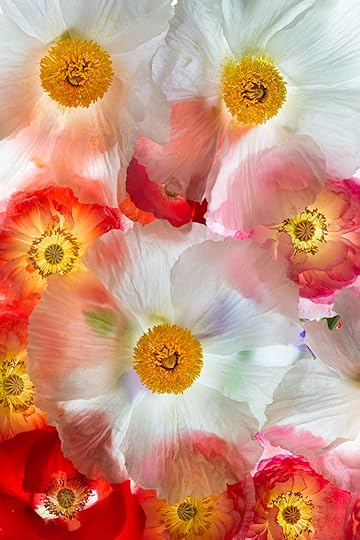 Summer Poppies © Harold Davis
Summer Poppies © Harold Davis
December 13, 2024
Ikebana
Ikebana is the Japanese art of flower arrangement. From its origins in Kyoto more than a millenia ago, this is an art form that has evolved within a formal tradition of considerable restraints.
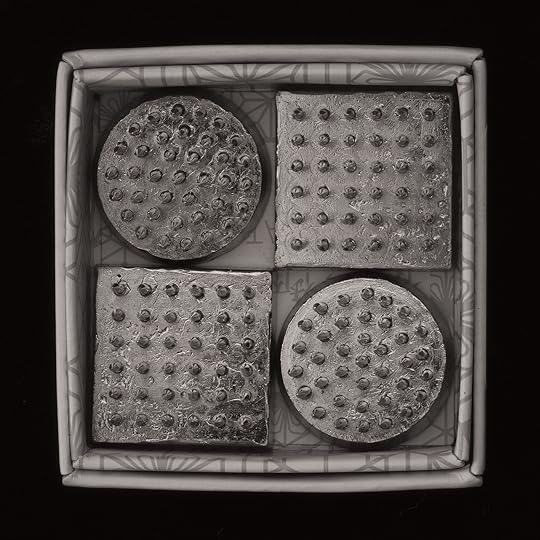 Small Ikebana Stands © Harold Davis
Small Ikebana Stands © Harold DavisRecently, in Kyoto, along with a friend I took a lesson in traditional ikebana.
I make no claims of ikebana mastery. Nor am I interested in ikebana flower arrangement along purely formal and traditional lines (although there are periodic attempts to loosen ikebana from its strict classical framework; see, for example, Punk Ikebana: Reimagining the Art of Floral Design).
But no knowledge is wasted. It’s great to add a whole new set of tools and techniques to my flower-arranging arsenal!
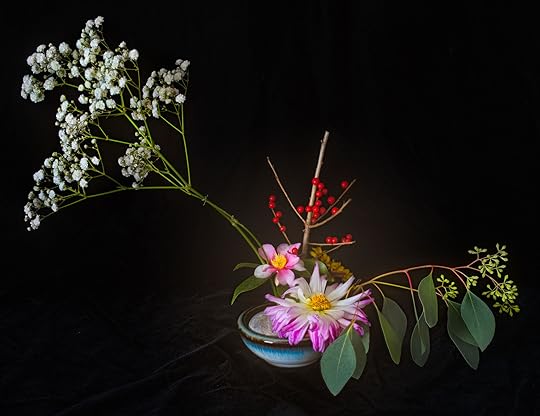 Arrangement © Harold Davis
Arrangement © Harold DavisThis arrangement (above) shows making use of some of the ikebana tools in a somewhat unconventional way.
The iPhone photo (below) shows me at the ikebana class in Kyoto posing with my work-in-progress arrangement.
 Harold in Kyoto © Harold Davis
Harold in Kyoto © Harold Davis
December 11, 2024
Iya Valley Sunrise
Iya Onsen Hotel perches high above the Iya River in the mountainous and less-traveled region that is in the interior of Shikoku, Japan’s fourth largest island. The area is magical, and the hotel is very special. A self-service tramway takes you down to the onsen (warm public baths) beside the river banks. If you are lucky, you will be entertained by a troop of wild monkeys while in the baths. There is also a very nice public onsen with a view over the valley up in the hotel itself.
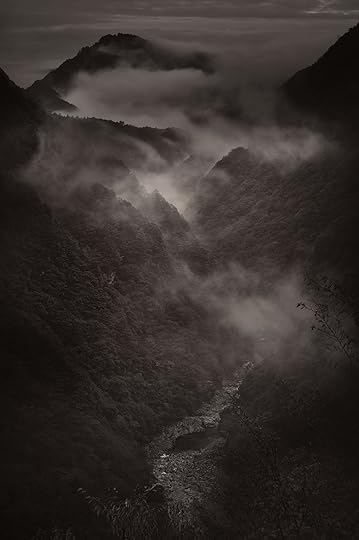 Iya Valley Sunrise © Harold Davis
Iya Valley Sunrise © Harold DavisEarly one morning I woke just before sunrise, and saw clearing fog over Iya Valley. Barefoot, I headed out to the terrace adjacent to our room.
Even considering the vast dynamic range of my Leica Monochrom M11, I could not capture both the brightening sky and the darkness of the valley in a single photograph. With the camera on a tripod, I made a series of six exposures at shutter speeds ranging from 1/60 of a second (to capture the sky) to 0.7 seconds (for illuminating the darkness of the valley). The captures were made at ISO 125 (the Monochrom’s native ISO) and f/3.4 using my Summilux-M 50mm f/1.4 lens.
Later—much later, at home using my production computer—I put the six exposures together in Photoshop, getting precisely the exposure values I wanted at every position in the image to create the image you see above.
Note: We are planning an encore Japan’s Art and Sacred Islands photography tour, with a stay at Iya Onsen, for November 2025. Please check our Workshops & Events page for updates, and for registration information when it is available,
November 30, 2024
Magical Month in Japan
I’m recently back from a magical time in Japan. Almost all parts of this journey were wonderful. I enjoyed traveling on my own to Nikko National Park, and the group I led photographically was very, very special. The photo below shows the group in their yukatas at a ryokan.
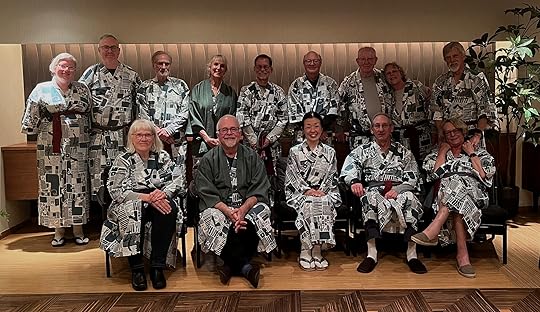 Photo credit: Brenda Robinson
Photo credit: Brenda RobinsonSo the yukatas are kind of like elegant bathrobes to wear in Japanese-style inns. Wearing them, one doesn’t have to worry about bringing dress-up clothes, and one can enjoy the long kaiseki meals, that are one part delicious foods, and one part entertainment. You can also wear them to the onsen changing rooms!
One of our participants kindly wrote us: “Bravo!!! You guys did a fantastic job of putting together a rich, substantial, beautiful introduction to a cross section of Japanese history, culture and beauty.
I particularly loved Iya Valley and the Ryokin there as well as the Ochiai and Nagaro Scarecrow
Villages. As well as the vine bridge, the canal and shops of Kurashiki, Hiroshima Peace Park and Museum. Of course the gardens and temples were amazing. And, my most cherished memory: walking down the mountain steps from the temple with Kana. Very special. Again, I am blessed by all that the three of you did to make it wonderful for us.”
If you are curious, you can check out the 2024 itinerary here. We will be running this photography tour again in the autumn of 2025, and will post the (slightly tweaked) 2025 itinerary as soon as it is available.
Meanwhile, it is great fun to travel (particularly in Japan!), but also very nice to be home with family, cat, and garden. Yesterday I planted these ranunculus bulbs in the garden, hoping for a glorious harvest of ranunculae and papavers in the spring! The photograph shows the bulbs in a Japanese lacquerware plate.
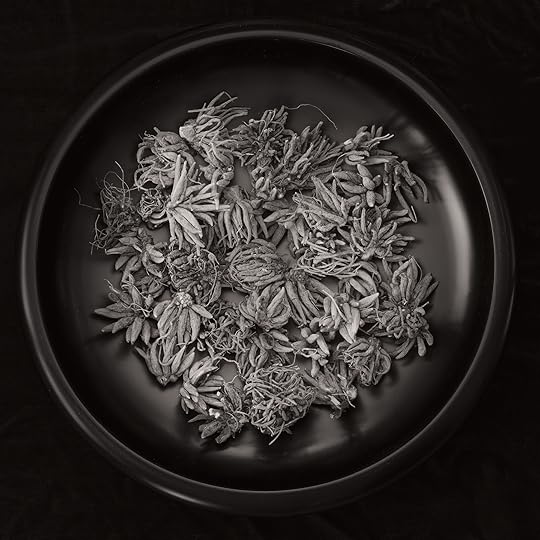 Ranunculus Bulbs © Harold Davis
Ranunculus Bulbs © Harold Davis
November 14, 2024
Reflections and that Hint of the Ineffable
Some photographic subjects resonate in the poetic sense. For example, spirals, bridges, the light at the end of the tunnel. Of course, this possible subject-matter resonance is not sufficient to create a provoking image. But many of us look for subject matter with that hint of the ineffable. I know I do.
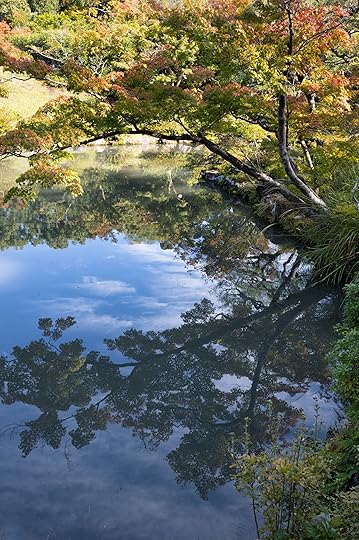 Autumn Reflections, Isuein Garden © Harold Davis
Autumn Reflections, Isuein Garden © Harold DavisThe spiritual and the ineffable is—oddly enough—not that far from the banal. Think unicorns and rainbows. One step over the line, and you crossed over from ineffable to warm and cuddly. So to pull off a compelling image when the subject matter is one of these cliches is a balancing act indeed.
 The World Is Upside Down © Harold Davis
The World Is Upside Down © Harold DavisReflections are one of those subjects that can straddle the boundary between banal and profound. To reflect is to think hard about something. Reflection involves fundamental principles of optics as well as principles of mathematics. Reflections at their best make us think differntly about the world—and maybe about ourselves!
November 3, 2024
Book Review: A Brief History of Photography (*****5-stars)
During downtime in Japan, when I’m on trains or relaxing after the onsen, and when I am not chasing waterfalls, I’ve been reading A Brief History of Photography by David S. Young (RockyNook, 2024). This is a fascinating book. If I could give it ten stars rather then the nominal 5-star top rating I would. It is an incredible and monumental achievement of organization, research, and compilation. Obviously a labor of love that took years to accomplish, the author (or “your scribe” as he often refers to himself) is to be sincerely congratulated.
I learned a great deal from this book about all kinds of things, from chemistry to optics to the business and politics of camera and lens manufacturing. Though we exist in a digital era, we should keep in mind that photography derives from optics and physics, regardless of the capture medium. As the saying goes, those who forget the past will…forget some important things.
Anyone who is remotely interested in serious photography should read this book. That said, I have some caveats and quibbles. I’ll get to my concerns in a bit.
The book is organized chronologically starting more or less with the camera obscura as fully described in 1558 by Giovanni Battista della Porta. Obviously, the entries get denser the closer we get to modern times.
I think I’m becoming a pretty “rare bird” as an actively practicing professional photographer in the digital era with my origins firmly in the olden analog days (I opened my first studio in New York City in 1978). In that light, I seriously enjoyed the trip down memory lane bringing up hardware with fantastical names that I’d long forgotten, like the Metz Mecablitz, a small strobe, and the Miranda SLRs, one of my first “serious” cameras.
Some notable people that played a role in my professional life are also mentioned; for example, Jacob Deschin (see a 1950 sidebar) who gave me my first solo exhibition in Manhattan at the Modernage Discovery Gallery, and Herbert Keppler (also a 1950 entry), who gave me exposure at an early point in my career in Modern Photography.
I learned some fascinating things on my journey through this book: for example, about the Leica Freedom Train. Apparently Leica and the Leitz family saved numerous souls from the Nazis at great personal risk (see the entry for 1938-1939 relating to this).
The author notes that following the end of World War 2 just before the iron curtain came down, the U.S. “liberated” 126 Zeiss optical technicians to the west, to found the Zeiss campus in Oberkochen in Bavaria because optical science has always had important military applications (see the entry for 1945). I feel compelled to add for color what I was told in the Zeiss cafeteria in Oberkochen: the reason that the small town of Oberkochen was chosen as the location for Zeiss West Germany is because that is where the rescue convoy ran out of gas.
I do have a problem with the book’s title. A book that weighs in at almost 400 pages of fairly small type is probably not best described as “brief.” But, quibbling aside, everything except the hardware side of photography is badly neglected. Sure, there are token entries for Ansel Adams, Diane Arbus, Richard Avedon, Weston, and a few other iconic names. But essentially, the entire artistic, aesthetic, and ideational side of photography—not to mention the business practice of making imagery as opposed to the business of making cameras and lenses—are ignored.
Photography has always had two strands of innovation: the tinkerers and inventors on the one hand, and those who pushed artistic, creative, and image making innovation on the other. No book can legitimately be called a history of photography without tackling both.
The annual PSA Progress Awards have been given each year since 1948 to honor “outstanding contribution to the progress of photography or an allied subject.” If you look at the list of awardees, it tackles this divide in a more evenhanded way. Along with the tinkerers and inventors such as Edwin Land and the Knoll brothers, artists such as Adams, Weston, and more recent photographers such as Art Wolfe and Frans Lanting are each given their place. Without cameras you wouldn’t have photographers, but without photographers you don’t bother to make cameras.
A more descriptive title would have been something like The Rise and Fall of the Analog Camera and Lens Industry. OK, I know it’s not very sexy as a title, but there’s a fascinating story here about the arc of a technology, with echoes of Ozymandius. When I was starting out in photography, who would ever have thought that Kodak would one day in the not too distant future go belly up?
On this topic, note that the subtitle is From the Very Beginning to the Age of Digital. Actually, the digital entries in the book are pretty sketchy. This is not entirely unexpected, as it is more reasonable to write “history” about events that are in the historical rearview mirror than it is to write history about an ongoing work-in-progress.
Most of the many fascinating sidebars in the book are titled “Trivia,” and this began to irritate me as many of them are not trivial at all. As an editorial choice, there should have been a great deal more variety in sidebar headers, or at least something less dismissive. It was something of a relief to me as a reader to come across the few sidebars titled “Oddities”—and lord knows there are indeed some extremely odd photographic contraptions shown in these sidebars.
I highly recommend this book. Click here to buy it directly from the publisher RockyNook (for a 40% discount use the code HDAVIS40 at checkout — in full disclosure I think I get a small affiliate fee) and click here to buy from Amazon.
November 1, 2024
Chasing Waterfalls
I’ve never understood the lyrics of the song “Don’t go chasing waterfalls.” Apparently, if you Google it, the lyric to this catchy tune (I’ve worked out to its beat at Orange Theory) “is a metaphorical warning against pursuing self-destructive behavior. Waterfalls appear beautiful and mesmerizing, but their currents run strong and lead to extreme and violent endings”.
I guess so, but I love them just the same. Waterfalls are wild, not tame, and full of patterns that are constantly in motion and always changing. I can enjoy waterfalls without being tempted to hurl myself over one.
Actually, chasing waterfalls with my camera seems like one of life’s better ways to spend my time! Herewith, a couple of recent waterfall “captures” from Nikko National Park in Japan (where I am now). I never get bored with catching waterfalls!
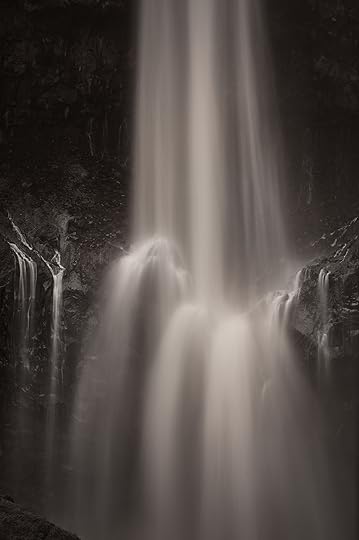 Chasing Waterfalls © Harold Davis
Chasing Waterfalls © Harold Davis
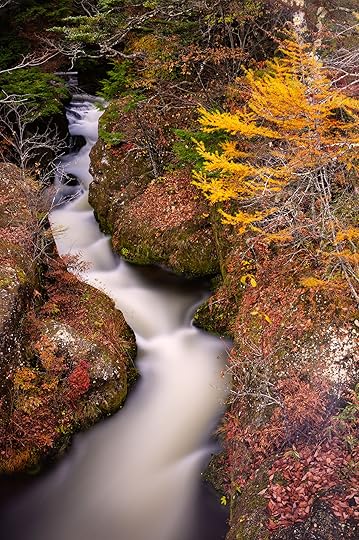 Above Ryuzu Falls © Harold Davis
Above Ryuzu Falls © Harold Davis
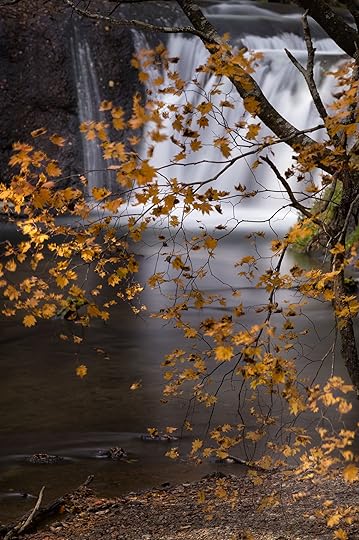 Kotaki Falls © Harold Davis
Kotaki Falls © Harold Davis
 Flowing Water © Harold Davis
Flowing Water © Harold Davis
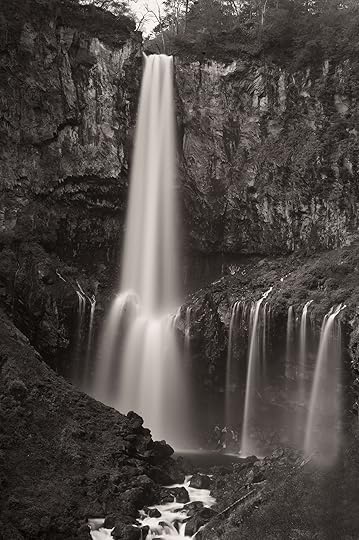 Kengon Falls (mono) © Harold Davis
Kengon Falls (mono) © Harold DavisI’m actually surprised and delighted at how many great waterfalls there are in this part of Japan. Catching them with my camera has been truly joyful.
Another great place to chase waterfalls is Iceland. Iceland’s waterfalls are pretty cool, too! Here’s a capture of Haifoss, and one of Godafoss from a 2021 trip to Iceland.
October 16, 2024
For the Love of Small Things!
The other day in my garden I looked under some leaves and found a family of small succulents. These plants were wonderful in their tiny spiralness, and I knew I had to photograph them.
 Happy Family © Harold Davis
Happy Family © Harold DavisI brought out my studio tripod and rearranged the leaves (it’s my garden so I can do what I want). Next, I added a focusing rail and my Novaflex bellows, attaching my Leica Monochrom M11 at the business end of the bellows and my Leica Macro-Elmar-M 90mm lens at the other.
 Small Succulent © Harold Davis
Small Succulent © Harold DavisThe combination of the bellows and the short telephoto lens gave me quite a bit of flexibility as to how much magnification I wanted, and also the ability to position myself with enough distance from the subject so that my shadow was not an issue.
By way of reference, the largest succulent in this “happy family” (shown above) is about 7.5cm (3 inches) in diameter, while the smallest one (shown below) is roughly 2cm (0.8 inches) across.
 Very small succulent © Harold Davis
Very small succulent © Harold DavisIf one looks closely, you never know what you’ll see! I had the greatest time photographing this miniature civilization of succulents up close and personal.
October 11, 2024
Poltergeist
As much as I love to travel to distant shores, I am a big proponent of the idea that you don’t have to travel to make cool images, and sometimes the best opportunities are where you live (or next door, or at least close-by). As Dorothy famously put it, “There’s no place like home!”
A case in point: this image of a shadow on our bathroom floor (below). Of course, the light had to be right, and the window aperture open to the correct degrees. A comment on my Instagram: this looks like a “poltergeist” [or, at least as poltergeists are visually represented in the movies].
 Tile Floor © Harold Davis
Tile Floor © Harold DavisMonochromatic imagery works particularly well with high contrast, lights, and shadows. Of course, you can also ignore colors, like the disreputable pale avocado of our bathroom tiles, installed long before we moved in 27 years ago. In any case, here’s a bonus light and shadow monochromatic image, of a dahlia from my garden (below).
 Dahlia Sunrise © Harold Davis
Dahlia Sunrise © Harold Davis
October 6, 2024
Socks Davis
Meet Socks, our three-month-old kitty and the newest member of the Davis family!
 Socks Davis © Harold Davis
Socks Davis © Harold Davis




